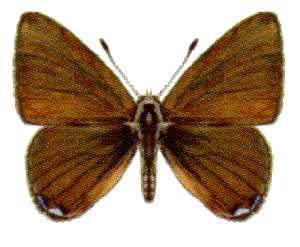
The large blue is a species of butterfly in the family Lycaenidae. The species was first defined in 1758 and first recorded in Britain in 1795. In 1979 the species became mostly extinct in Britain but has been successfully reintroduced with new conservation methods. The species is classified as "near threatened" on the IUCN Red List of Threatened Species. Today P. arion can be found in Europe, the Caucasus, Armenia, western Siberia, Altai, north-western Kazakhstan and Sichuan.

Lycaenidae is the second-largest family of butterflies, with over 6,000 species worldwide, whose members are also called gossamer-winged butterflies. They constitute about 30% of the known butterfly species.
Copper is a chemical element with symbol Cu and atomic number 29.

Phengaris alcon, the Alcon blue or Alcon large blue, is a butterfly of the family Lycaenidae and is found in Europe and across the Palearctic to Siberia and Mongolia.

Illidge's ant-blue butterfly, is an endangered species of butterfly endemic to Australia. This species can be found at six confirmed sites: Mary River Heads, Beaver Rock and Maaroom in the Fraser Coast Region (Queensland); Redland Bay and Point Halloran in the City of Redland (Queensland), and Brunswick Heads.

The grey ant-blue is a butterfly native to Australia.

The chocolate-backed kingfisher is a species of kingfisher in the subfamily Halcyoninae which occurs in western Sub-Saharan Africa.

The blue-lored antbird is a species of antbird in the family Thamnophilidae. It is found at low levels in humid Andean forests in western and northern Colombia, western Venezuela. It formerly included the Zeledon's antbird as a subspecies. The blue-lored antbird feeds on insects, and regularly follows swarms of army ants in order to catch prey flushed by the swarms, but it is not an obligate ant-follower like some species of antbirds. The blue-lored antbird is strongly sexually dichromatic: the male has an entirely black plumage, while the female has a rufous-brown plumage and a black mask. Both sexes have a blue patch of skin around the eyes.
The Geelong Field Naturalists Club (GFNC) is an Australian regional amateur scientific natural history and conservation society which was founded in 1961 by Trevor Pescott. It is based in Geelong, Victoria, with the aims of:

Acrodipsas brisbanensis, the bronze ant-blue or large ant-blue, is a butterfly of the family Lycaenidae. It is found in Australia.

Acrodipsas cuprea, the copper ant-blue or cuprea ant-blue, is a butterfly of the family Lycaenidae. It is found in Australia, from southern Queensland to Victoria.

Acrodipsas myrmecophila, the small ant-blue, is a butterfly of the family Lycaenidae. It is found in the south-east of Australia.

Acrodipsas arcana, the black-veined ant-blue or arcana ant-blue, is a butterfly of the family Lycaenidae. It is found inland on hills in southern Queensland and northern New South Wales in Australia.

Acrodipsas aurata, the golden ant-blue, is a butterfly of the family Lycaenidae. It is found in the mountains of New South Wales and northern Victoria in Australia.
Acrodipsas decima, the Decima ant-blue, is a butterfly of the family Lycaenidae. It is found in a small area of the Northern Territory in Australia.
Acrodipsas hirtipes, the hirtipes ant-blue or black ant-blue, is a butterfly of the family Lycaenidae. It is found in the Northern Territory and on the Cape York Peninsula in Australia.
Acrodipsas mortoni, the brown ant-blue, is a butterfly of the family Lycaenidae. It is found in inland New South Wales and southern Queensland in Australia.

Camponotus herculeanus is a species of ant in the genus Camponotus, the carpenter ants, occurring in Northern Eurasia, from Norway to Eastern Siberia, and North America. First described as Formica herculeana by Linnaeus in 1758, the species was moved to Camponotus by Mayr in 1861.
This page is based on this
Wikipedia article Text is available under the
CC BY-SA 4.0 license; additional terms may apply.
Images, videos and audio are available under their respective licenses.












